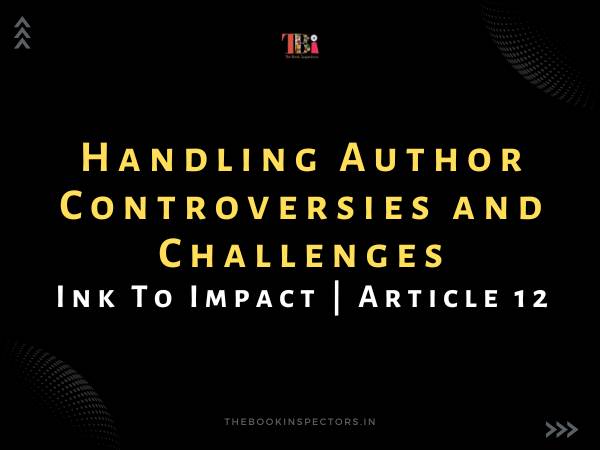In the journey of establishing oneself as an author, navigating through controversies and challenges is almost inevitable. As writers, we often find ourselves in the spotlight, and with that attention comes the potential for misunderstandings, disagreements, and sometimes even full-blown controversies. How we handle these situations can significantly impact our brand and the perception of our work.
In this article, we delve into strategies for addressing and overcoming author controversies and challenges, preserving our integrity while continuing to thrive in the literary world.
Understanding the Nature of Author Controversies
Controversies can arise from various sources, including contentious themes explored in our writing, public statements made on social or political issues, or even personal behaviour outside of our literary endeavours. While some controversies may stem from genuine misunderstandings or differing interpretations of our work, others may be fueled by misinformation, jealousy, or ideological differences.
1. Transparency and Authenticity
In times of controversy, maintaining transparency and authenticity is paramount. Address the issue head-on, acknowledge any mistakes or misinterpretations, and provide context or clarification where necessary. Being honest and genuine in our responses can help rebuild trust and credibility with our audience.
Transparency and authenticity serve as pillars of trust in any relationship, including the one between authors and their readers. When faced with controversy, it’s essential to communicate openly and honestly, addressing concerns directly rather than attempting to sweep them under the rug. By acknowledging any missteps or misunderstandings and providing transparent explanations or clarifications, authors can demonstrate their commitment to integrity and accountability. This approach not only fosters trust and credibility but also lays the foundation for constructive dialogue and resolution.
Ink To Impact | Article 11 | Community Building and Networking for Authors
2. Engage in Constructive Dialogue
Rather than resorting to defensiveness or aggression, approach controversies with a willingness to engage in constructive dialogue. Listen to the concerns and perspectives of others, and respond thoughtfully and respectfully. Engaging in meaningful conversations can often lead to greater understanding and resolution.
Constructive dialogue is essential for navigating through controversies effectively. Instead of reacting defensively or dismissively to criticism, authors should approach disagreements with an open mind and a willingness to listen. By actively engaging with critics and stakeholders, authors can gain valuable insights, address misconceptions, and find common ground. This collaborative approach not only fosters mutual respect and understanding but also paves the way for constructive solutions and reconciliation.
3. Stick to Your Values
Amidst controversy, it’s essential to stay true to our core values and principles as writers. Refrain from compromising your integrity or diluting your message to appease critics. Instead, use the opportunity to reaffirm your commitment to your beliefs and the authenticity of your voice.
Maintaining integrity and staying true to one’s values is crucial when faced with controversy. In the face of criticism or pressure to conform, authors must remain steadfast in their convictions and resist the temptation to compromise their principles for the sake of appeasing others. By staying true to their values and staying authentic to their voice, authors can weather controversies with grace and emerge stronger and more resilient in the process.
4. Seek Support from Your Community
During challenging times, lean on your literary community for support and guidance. Reach out to fellow authors, mentors, or trusted friends for advice and encouragement. Having a strong support system can provide perspective and help navigate through turbulent waters.
The importance of community support cannot be overstated when navigating through controversies. In times of adversity, authors should not hesitate to lean on their peers for guidance, encouragement, and solidarity. Whether seeking advice from mentors, sharing experiences with fellow authors, or simply finding solace in the camaraderie of like-minded individuals, the support of a strong literary community can be invaluable in helping authors navigate through challenges with resilience and grace.
Ink To Impact | Article 10 | Visual Branding: Crafting an Impactful Author Brand Image
5. Learn and Grow from the Experience
Every controversy presents an opportunity for growth and self-reflection. Take the time to reflect on the situation objectively, identify any lessons learned, and consider how you can apply those insights to future interactions and endeavours. Embrace controversy as a catalyst for personal and professional development.
While controversies can be challenging and uncomfortable, they also present valuable opportunities for learning and growth. Instead of dwelling on past mistakes or shortcomings, authors should approach controversies as learning experiences, extracting valuable insights and lessons that can inform their future actions and decisions. By embracing controversy as a catalyst for personal and professional development, authors can transform adversity into opportunity and emerge stronger and more resilient in their craft.
Preventing Future Controversies
While it’s impossible to completely avoid controversy as an author, there are proactive steps we can take to minimize the likelihood of future challenges:
1. Clarify Intent and Context
When addressing sensitive topics in your writing or public statements, ensure clarity of intent and provide the necessary context to prevent misinterpretation. Be mindful of how your words may be perceived by different audiences and strive for clarity and nuance in your communication.
2. Conduct Yourself Professionally
Maintain professionalism in all aspects of your authorial persona, both online and offline. Avoid engaging in inflammatory or disrespectful behaviour, and exercise caution when discussing contentious issues. Remember that as public figures, our actions and words carry weight and can impact our reputation.
Ink To Impact | Article 09 | Telling Your Story: Sharing the Author’s Journey
3. Stay Informed and Open-Minded
Stay informed about current events, social trends, and evolving cultural norms. Cultivate an open-minded attitude towards differing viewpoints and be willing to adapt your perspective based on new information. Being well-informed and receptive to diverse perspectives can help mitigate misunderstandings and prevent conflicts.
4. Build Positive Relationships
Invest time and effort into building positive relationships with readers, fellow authors, and industry professionals. Foster a reputation for professionalism, integrity, and respectfulness in your interactions, and prioritize building trust and goodwill within your community.
By proactively addressing author controversies, staying true to our values, and continually striving for growth and improvement, authors can navigate through challenges with resilience and integrity. Embrace the opportunity to learn from adversity, strengthen relationships within your literary community, and emerge stronger and more resilient in your craft.
More Blogs in the series:
Ink To Impact | Article 07 | Authenticity: The Cornerstone of a Successful Author Brand
Ink To Impact | Article 06 | Social Media Mastery for Indian Authors
Ink To Impact | Article 05 | Engaging with Your Readers: Building Author-Reader Relationships
Ink To Impact | Article 04 | The Power of Consistency in Author Branding
Ink To Impact | Article 03 | Shaping Your Authorial Persona
Ink To Impact | Article 02 | Self-Discovery: Finding Your Unique Voice
Ink To Impact | Article 01 | Unleashing Your Author Brand
Contact Us For All Your Marketing Needs!


[…] Ink To Impact | Article 12 | Handling Author Controversies and Challenges […]